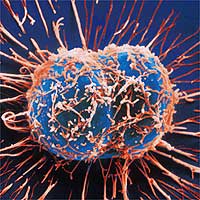Researchers at the Ohio State University Comprehensive Cancer Center have discovered the first inherited gene mutation that increases the risk for chronic lymphocytic leukaemia.
Chronic lymphocytic leukaemia (CLL), a cancer of the lymphocytes, is the most common type of leukaemia. It is a blood and bone-marrow disease and mainly affects people over 60. And it occurs more often in men than women.
The study revealed that the inherited mutation greatly reduces the gene’s protective activity. Furthermore, a second kind of change occurs later that turns the gene off altogether, leading to leukaemia. This latter alteration is a chemical change called DNA methylation and it is not inherited. Healthy cells use this process to silence unneeded genes. But abnormal DNA methylation can turn off genes that control cell growth, and that lead to tumour growth.
John C. Byrd, professor of internal medicine and a CLL specialist, said
“Our findings identify for the first time a gene that appears to be associated with hereditary CLL,”
“They also show the importance of the gene in the pathogenesis of CLL, and direct us to target this gene with therapies that might re-activate it.”
Researchers examined a family in which the father, four sons, a grandson, and a distant female relative developed this form of leukaemia. The mutation was identified in a gene called DAPK1. DAPK1 or death-associated protein kinase 1 is a tumour suppressor which helps trigger the death of cells before they become cancerous.
Albert de la Chapelle, professor of molecular virology, immunology and medical genetics and a researcher with the Ohio State human cancer genetics program, said
“This inherited change is remarkably subtle. It does not shut down the gene, but just lowers its expression somewhat. Recently, many cancer geneticists have come to believe that such subtle changes are common causes of cancer, and this is one of the first, strong examples of that principle,”
The findings could help identify people at risk for chronic leukaemia, but they also may provide new insights into the process of natural cell death. They may even lead to new strategies for treating the disease. The findings also provide evidence that some genes might contribute to cancer even when they are not silenced entirely.
READ : Biology News Net Cancerbackup
IMAGE CREDIT




